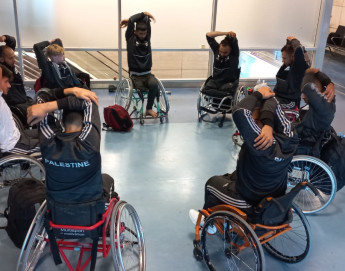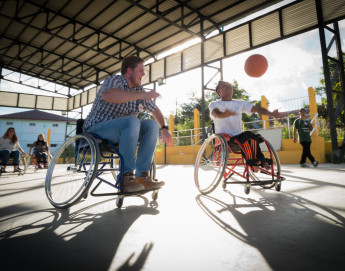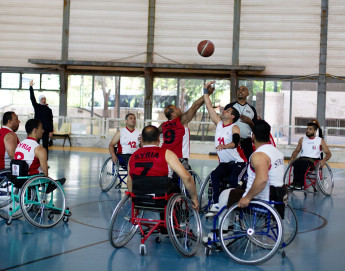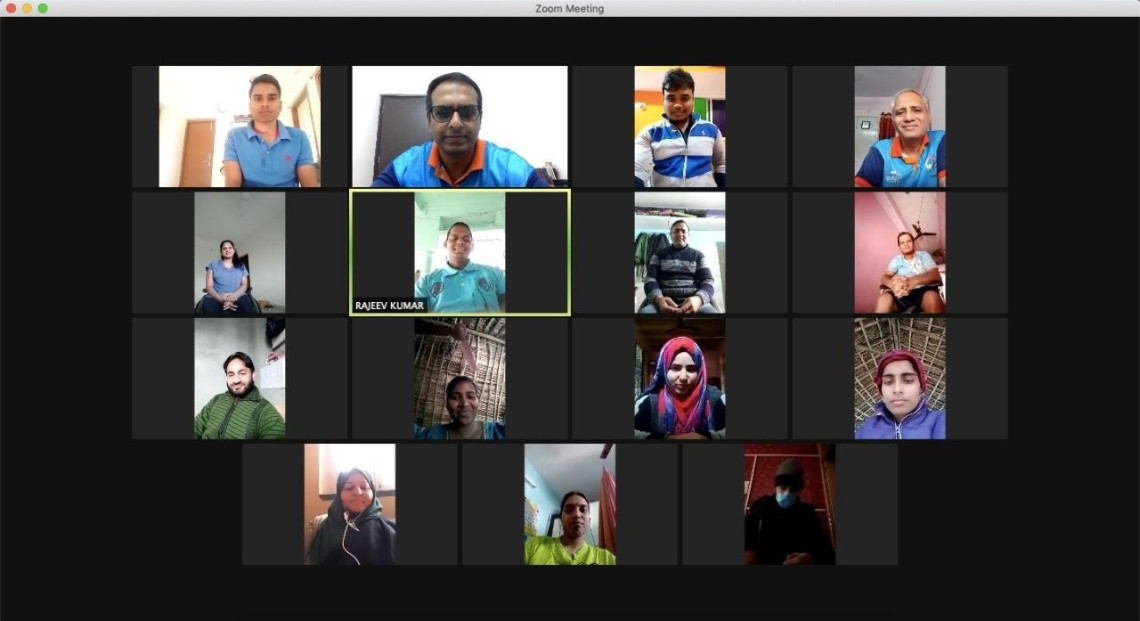
Wheelchair basketball: Virtual training during pandemic ups the game for many teams
When coconuts and melons double as basketballs, tyre tubes become gear for stretching exercises and wheelchairs are hung by hooks from the ceiling for wheel spinning competitions, you can tell that something is brewing. Wheelchair basketball training, one of the main activities promoting social inclusion of people with disabilities under the Physical Rehabilitation Programme of the International Committee of the Red Cross (ICRC), reached a whole new level of improvisation as it turned virtual while the world reeled under the impact of the COVID-19 pandemic.
Though physical training was abruptly suspended in most countries because of restrictions related to the COVID-19 pandemic, neither the players nor the coaches could stay away for too long from the game they love. So, in July 2020, the ICRC's disability sport and inclusion adviser Jess Markt and coaching consultant Joseph Higgins (Joe) initiated a plan to coach teams virtually. Talking from the sidelines of India's first International Wheelchair Basketball Tournament held recently, Markt shared that it began as a "temporary band-aid to get through the COVID-19 months" but has now become a model that can greatly improve the ICRC's Physical Rehabilitation Programme.

ICRC's disability sport and inclusion adviser Jess Markt and coaching consultant Joseph Higgins
The initial idea was to help players continue to engage, stay motivated and hopefully improve while we couldn't visit them for physical training because of travel restrictions. At the time, we had not anticipated the pandemic to last two-and-a-half-years. We began pilot testing a few different models with the teams from Cambodia, Bangladesh, Myanmar and India, teaching athletes to train at home.
- Jess Markt
The programme gradually expanded and is now run in 15 countries, including Syria, Palestine and Libya, which were also part of the tournament in India.
Players from the Cambodian team shared how the virtual training was a steep learning curve for them both in the skills of the game but also in using technology to their benefit. "We couldn't meet each other for over two years, so we used to connect on Zoom for the training with coach Joe. Since we were all at our own homes and did not have the space or the equipment for our normal routine, we had to get creative and use whatever we could grab to practice shooting techniques and do muscle-building exercises. I used coconuts instead of a basketball," shared Sieng Sokchan from Cambodia.
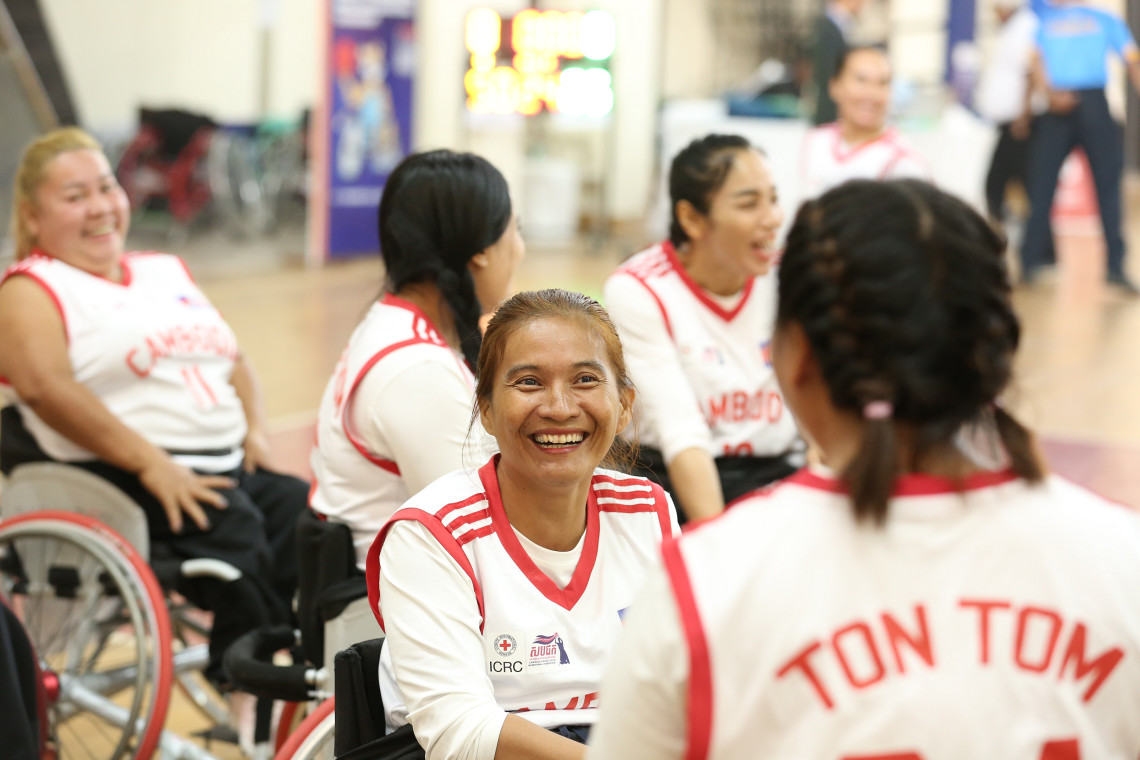
A mother of two, Sokchan added that if they had stopped training during the pandemic, they would have forgotten their skill. "The online training helped to keep us going. We also had to learn to operate Zoom. It felt complicated initially and sometimes we didn't know how to turn on the camera or how to position it. Took a few days to figure it out," she said.
Her teammate Soem Da said they would spend nearly five hours every day on these video calls. "We used to sweat it out and get tired like we did in our physical training sessions. But it was also funny seeing each other on screen trying to practice techniques," she said.
As countries started relaxing their COVID-19 restrictions a bit, the Cambodian team was able to go back to the court. "We set up cameras around the court so that Joe, who is based in Vancouver, Canada, could coach us in real time. The team's coach on the court would communicate with Joe through a headset and direct the practice," said Markt.

Laith Al-Mobayed from the Syrian team shared that they had to find internet cafes or coffee shops where they could join the call on Zoom because the application cannot be accessed on all local networks. "Our teammates would figure out some cafe where we could gather and attend the training. Some of the players had to travel for two hours to reach the decided venue. But we had a pact that each of us will do whatever it takes to improve our play," he said.
During the virtual training, the team worked on new techniques and learnt to analyse opponents and change their own strategies where needed. Laith shared that they did exercises such as spinning the wheels of their wheelchair for ten minutes without stopping to improve their swiftness on court. "We hung our wheelchairs from hooks on the ceiling at home and did this exercise. When we could go back to the court, we had to cover half court within four seconds and shoot a basket from different positions. If we missed, we had to do it all over again. It really helped us improve," he said. Their motivation, Laith shared, was that the players wanted to be seen and use the opportunity to help people understand that Syrians have another side to them.
About 15 players from the Indian men's and women's teams participated in the virtual training. Capt. Louis George Meprath, their coach, said the sessions focused on basic rules, fitness exercises, techniques to push wheelchairs in limited spaces, shooting and passing techniques. "Many players did not have sports wheelchairs so during the online training they did all the drills using personal wheelchairs or ordinary chairs or while sitting on the floor or their beds. Instead of dumbbells they used filled-up water bottles for exercises. The players were eventually convinced that all wheelchair skills can be practiced indoors and in limited spaces too," he said.
For Markt, the international tournament in India was visible proof of the impact of the virtual training. Carefully observing the matches, Markt said, "The countries that are really playing well are the ones that committed to virtual training. We knew it would help but we weren't sure if they were going to dramatically improve. So, it's amazing to watch these guys in action; their commitment to detail, technique and regular practice has really changed the level of their play. They are several levels above where they were in 2020, which is incredible."

